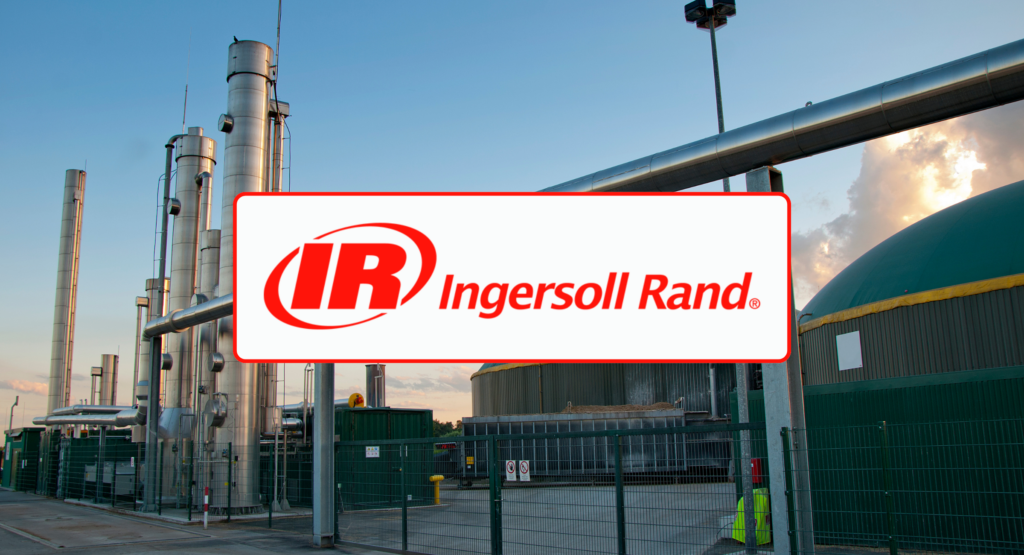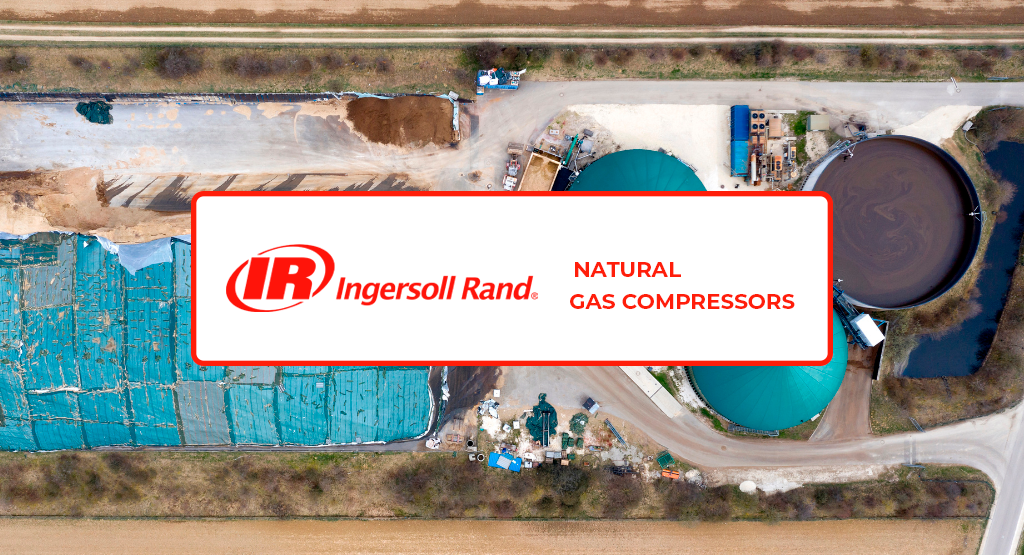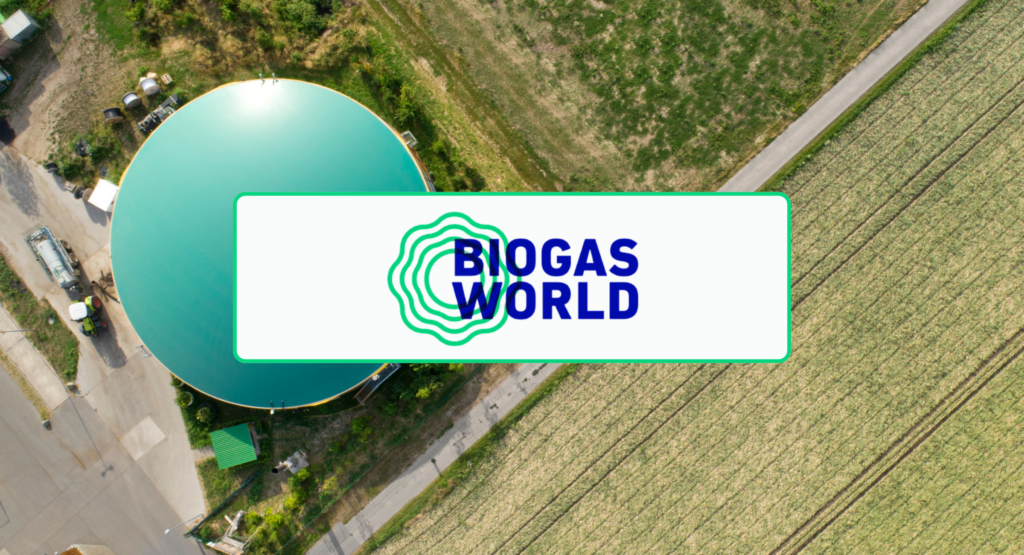Natural Gas Compressors for Biogas & Biomethane

Turning Waste into Energy with Ingersoll Rand Compressors
Biogas and biomethane are leading the shift toward renewable energy by turning organic waste into power. Biogas comes from breaking down organic materials like farm leftovers, animal manure, city trash, and plants without oxygen. This process makes mostly methane and carbon dioxide, plus a few other gases.
Biomethane is biogas that goes through a cleaning step to take out impurities and carbon dioxide, giving us a methane-rich fuel. This cleaner gas matches the quality of natural gas and works for fueling vehicles or adding to gas networks.
As the world seeks greener energy and ways to reduce greenhouse gases, interest in these fuels is climbing. They help in making energy from different sources and managing waste by changing organic trash into electricity and heat. As this interest grows, gas compressors from companies like Ingersoll Rand are key in making biogas and biomethane plants run well.
These plants use Ingersoll Rand’s advanced screw gas and reciprocating gas compressors, which are at the heart of making facilities work efficiently and reliably. They help in making energy from waste, saving costs, improving gas quality, and caring for the environment.
What Are Biogas & Biomethane?
Biogas and biomethane plants are changing how we think about sustainable energy. Biogas is a renewable energy source made from the anaerobic digestion of organic matter, like farm waste, animal waste, city trash, and plant debris. This process gives us a mix mostly made of methane and carbon dioxide, with small amounts of other gases.
Biomethane is the product of processed biogas. This step takes out unwanted parts and carbon dioxide, leaving a high-methane gas. This upgraded gas is like natural gas and can enter gas grids or be used as a clean fuel for cars.
More and more, the world is choosing these clean fuels to lower greenhouse gas emissions. Biogas and biomethane not only give us more ways to make energy but also tackle waste, turning what we throw away into useful heat and power. As this trend grows, the part that natural gas compressors play in making these plants work better is getting more important.
The Role of Compression in Production
Natural gas compressors are key to biogas and biomethane plants, helping at different stages of making and moving the gas. They mainly boost the gas pressure, making it easier to store, transport, and use.
Compressors in biogas plants take the gas made from anaerobic digestion and increase its pressure. This step is needed for several reasons:
1- Moving Gas: When biogas is compressed, it moves better through pipes to places where it can be turned into electricity or upgraded to biomethane.
2 – Storing Gas: Compressing biogas shrinks its volume, making it easier to store. This helps balance the times when we make gas and when we need it.
3 – Making Biomethane: To change biogas into biomethane, it must be cleaned and compressed. Compressors are important in the systems that remove CO2 and other things we don’t want, making sure the gas is good enough for different uses.
4 – Putting Gas in the Grid: Biomethane needs to be under enough pressure to fit into the existing natural gas grid. This step is key for adding renewable gas to our energy mix without issues.
5 – Packing More Energy: Compression raises the gas’s energy content, so it becomes a better fuel for heating, making electricity, or in vehicles instead of fossil fuels.
By using natural gas compressors, biomethane and biogas production facilities keep a steady flow and pressure of gas, make the most of the anaerobic digestion process, and make sure the gas is pure enough for its final use. Compressors are essential for these plants to succeed.
Screw Gas Technology
Ingersoll Rand‘s screw gas compressors excel in biogas and biomethane settings, offering efficiency and dependability. Designed for non-stop use, these compressors give a constant stream of compressed gas. This steady output is key for the smooth running of biogas plants.
- Saving Energy: Screw compressors help save on energy, reducing wasted power, leading to less energy use. This efficiency can mean lower electric bills for those running the plants.
- Cutting Costs: Screw gas compressors have fewer parts that move compared to other compressors. This means they usually cost less to maintain and have less downtime. They’re also built to last, which means savings over time in running costs.
- Maintaining Gas Quality: Screw technology’s precision helps in handling and refining biogas. It keeps the pressure even, which is important when upgrading biogas to biomethane.
- Helping the Environment: Screw compressors are a greener choice, using less power. This means biogas and biomethane plants leave a smaller carbon footprint.
Ingersoll Rand‘s screw gas technology is a strong choice for those who produce biogas and biomethane. It supports the consistent operation of treatment plants, helps in generating electricity, and is a reliable source of energy for handling agricultural waste and landfill gas. These systems, often called anaerobic digesters, benefit from the steady and efficient function of screw gas compressors.
Reciprocating Gas Technology
Ingersoll Rand‘s reciprocating gas compressors are crafted to handle the tough demands of biogas and biomethane production. They deliver performance that’s customized for the unique requirements of these energy plants.
- Saving Energy: These compressors can achieve high compression levels with less energy, perfect for when high pressure is needed. They’re engineered to work efficiently, which is great for situations with changing pressures and flows.
- Lowering Costs: Built to last and easy to fix, Ingersoll Rand‘s reciprocating compressors can be serviced right where they are used, which can help reduce repair time and expenses. The materials and build reduce wear, leading to savings over the compressor’s life.
- Quality Gas: Getting the compression right is crucial for good biogas. Reciprocating compressors control compression well, which is key for taking out impurities and making sure biomethane is pure enough for use.
- Helping the Environment: Effective compression and cleaning of biogas with these compressors help lower methane emissions—a major greenhouse gas. They play a part in turning biogas into biomethane, steering organic waste away from landfills, lessening environmental harm, and supporting a circular economy.
Both screw and reciprocating gas technologies from Ingersoll Rand are important in pushing the efficiency and performance of biogas and biomethane plants forward. They meet the need for cost-effective, high-quality, and eco-friendly solutions in the field of renewable energy, where biogas is produced and managed.






Comments